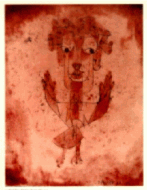Calls for papers

International Journal of Management Concepts and Philosophy
Special Issue on: "Looking"
Guest Editors:
Steve Brown, University of Leicester, UK and University for Humanistics, The Netherlands
Lena Olaison, Copenhagen Business School, Denmark and University of Essex, UK
Bent Meier Sørensen, Copenhagen Business School, Denmark
 “Angelus Novus shows an angel looking as though he is about to move away from something that he is fixedly contemplating. His eyes are staring, his mouth is open, his wings are spread.” “Angelus Novus shows an angel looking as though he is about to move away from something that he is fixedly contemplating. His eyes are staring, his mouth is open, his wings are spread.”Walter Benjamin, 'On the Concept of History', 1940 |
Organisations are obsessed with looking ahead, forecasting, envisioning, strategising. Organisations keep looking ahead into their fantasised futures. Perspectivism, project work, future scenarios, framing, and also diagrams, statistical analysis; they all involve the senses of the eyes to get a better grip on developments in organisations.
The angel in Paul Klee's painting, which Benjamin calls the Angel of History, has on the contrary his back to the future. The angel looks at the present. The financial crisis confirmed the artist's insight: a lot could have been learned if the financial institutions had looked at history instead of gazing at the fantasy of unlimited future profit.
Looking is never a neutral activity. The struggle for vision raises high stakes - economic, strategic, moral and political. Not looking or looking in the wrong direction can be devastating, but so too can misplaced vision, the wrong kind of looking. For looks themselves can be deceiving.
Looking objectifies. The subject of the gaze consumes the object it perceives. Looking constitutes images as objects. The male gaze calls forth and reifies particular versions of gender; the colonial gaze demands the exotic and the subaltern; the capitalist gaze sees commodities and calculations. When gaze is refined and extended through formal organisations it produces a fixed system of subjects and objects.
Contrary to vision, which is something you generally 'have', looking, like organising, is a verb. Looking is an act. You actively look, even if you don't look for something in particular. This is why being looked at also becomes important: the act of looking implies - or creates - categories and divisions. When looking becomes formalised as an organisational practice it necessarily creates contrasts and comparison. We become objects caught up in the gaze of others. Unlike hearing, looking operates with a clearly defined field, a space of organising and ordering, of points of reference and focus, but also of blindspots, places for hiding and limits.
Compared to touch and taste, which involve direct contact between the perceiving and perceived, looking may be said to operate with and reproduce distance. We can look at something from a distance: sometimes, in fact, being too close may be a hindrance to the sight. There is also a difference between looking-at, from a shorter or longer distance, and looking-into, in which case the spectator might go from being a passive observer to being a more actively involved participant.
This call for papers invites contributions that interrogate 'looking' in an organisational context. How can we question the visual sense in order to find a ground for critical analysis of contemporary developments in organisations? What are the contours and limits of perceptual spaces driven by vision? How do they objectify, reify, categorise and classify? Is it possible to escape regimes of gaze, to make oneself invisible or imperceptible?
The issue will carry revised and substantially extended versions of selected papers presented at the Aesthetics & Organization Workshop on the senses, co-organised by the University for Humanistics at Utrecht, Essex Business School at the University of Essex and the Department of Management, Politics and Philosophy at Copenhagen Business School. But we also strongly encourage researchers unable to participate in the workshop to submit papers for this call.
Subject CoverageThe following list should inspire contributors, but doesn’t exhaust the theme:
- The visual and non-visual in organisational life
- The imagery in/of organisations
- The visual arts and organisations
- Visual narratives
- The visual organisation
- Looking/understanding
- Looking/observing/inspecting
- Enlightenment, seeing with knowledge
- Image/imaginary/imagination
- Fantastic/fantasia
- Looking/wandering
- Blind, blinded, blindness
Notes for Prospective Authors
Submitted papers should not have been previously published nor be currently under consideration for publication elsewhere. (N.B. Conference papers may only be submitted if the paper was not originally copyrighted and if it has been completely re-written).
All papers are refereed through a peer review process. A guide for authors, sample copies and other relevant information for submitting papers are available on the Author Guidelines page.
Important Dates
Manuscripts due by: 1 May, 2012
Notification to Authors: 1 August, 2012
Final Versions Due: 1 October, 2012